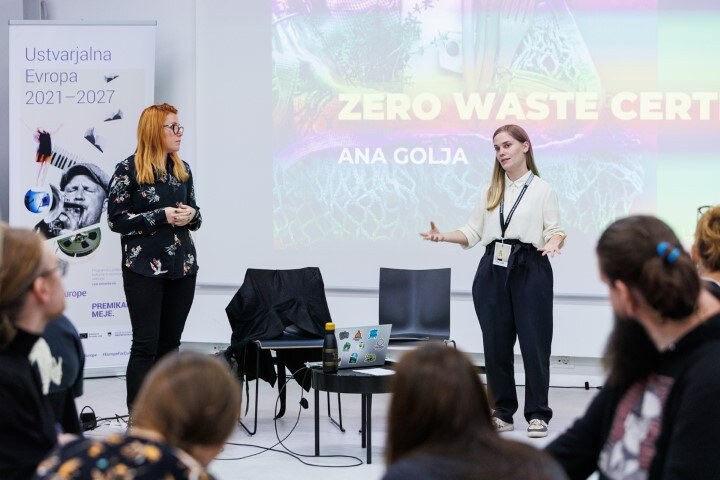At the very start of the discussion, which was described as a “therapy session” by participating representatives of 24 different organisations, a common sense of unease was clearly expressed on account of a lack of knowledge, tools and sources necessary for the introduction of more sustainable practices, alongside the inability to influence systemic changes.
Through the exchange of experiences, the participants highlighted the following CHALLENGES faced by the cultural sector in the implementation of (more) sustainable approaches:
1. Lack of knowledge and exchange of information – producers lack specific and detailed instructions, guidelines and good practice examples for the implementation of reasonable measures; it would be desirable to enhance the flow and exchange of information, e.g. about the relevant applications monitoring the use of energy products and their effects.
2. Lack of human resources and funding – faced with existential problems and the precarity of the sector, organisations unfortunately consider the financial aspect as a primary concern, while sustainable practices, out of necessity, consequently remain low on the list of priorities.
3. Dependence on outsourcers – to pursue its activities, the sector needs a great deal of outsourcers and partners, who often lack awareness of sustainable practices, which is in turn associated with problems in the search for appropriate partners or providers of various services, e.g. catering, hotel accommodation, technical equipment providers, and carriers, who would be certifiably focused on sustainable operations while being affordable.
4. Inadequate (non-proprietary) infrastructure – producers without their own infrastructure are as users mostly faced with energy-inefficient and wasteful buildings they use as tenants, whereby they – upon non-existing systemic measures – have no or little influence over it.
5. Communication challenges – online communication in terms of creating digital waste which the target audience no longer detects, and traditional communication in terms of awareness about the senselessness of excessive volumes of printed matter, but at the same time the need to reach audiences with poor digital literacy.
6. Impaired mobility – inadequate conditions for the organisation of sustainable transport/mobility pose a systemic challenge that is beyond the control of the sector (the selection of the “greenest” public transport in our region is a major challenge, since railway connections do not exist or are time-consuming).
On the other hand, the Forum also highlighted some GOOD PRACTICES that organisations can use relatively simply and quickly in their operations with some effort and planning [cf. examples (a)–(c) below], whereby some of them represent positive cases of systemic cooperation for an increased sustainable impact of various services and at various levels [cf. examples (d)–(e) below]:
a. Shared use of (own/borrowed) material or equipment, rather than dedicated purchasing/provision of new equipment solely for the purposes of the organisation/production of a single event (e.g. encouraging volunteers at a film festival to use their own cutlery; the use of second-hand costumes (common holding) for the purposes of executing various shows).
b. “Zero waste” approach to the provision of information and printing of promotional materials (the public has become more and more aware and economical in the use of printed matter; upon transfer to digital communication, the fact and challenge remains that printed matter often addresses the audience with poor digital literacy, while caution should be taken not to create digital waste with digital materials: a message must be provided with focus and without information clutter; it would make sense to keep a record of printed materials and strive for the gradual reduction of circulations while prompting users to treat printed matter in a responsible way; one option is to use sustainable paper made of invasive plant species; occasionally, it is possible to recycle own materials, etc.).
c. Programming changes and adjustments (seasonal adjustment of a programme timeline and the postponement of events to months that are more favourable, both for the attendance of the audience as well as reducing energy consumption at venues; engagement of visiting creative professionals for several activities rather than just one performance/show, e.g. by linking with other organisers to plan tours).
d. Cooperation with the competent environmental organisations (for instance, if an event organiser attends zero waste training provided by Ecologists without borders, they can make use of free-of-charge waste disposal for their event).
e. Cooperation with local authorities (the implementation of practices promoting responsible waste treatment: e.g. no waste bins along paths in adventure parks that are located in natural heritage reserves, but merely at the entrance to the park).




